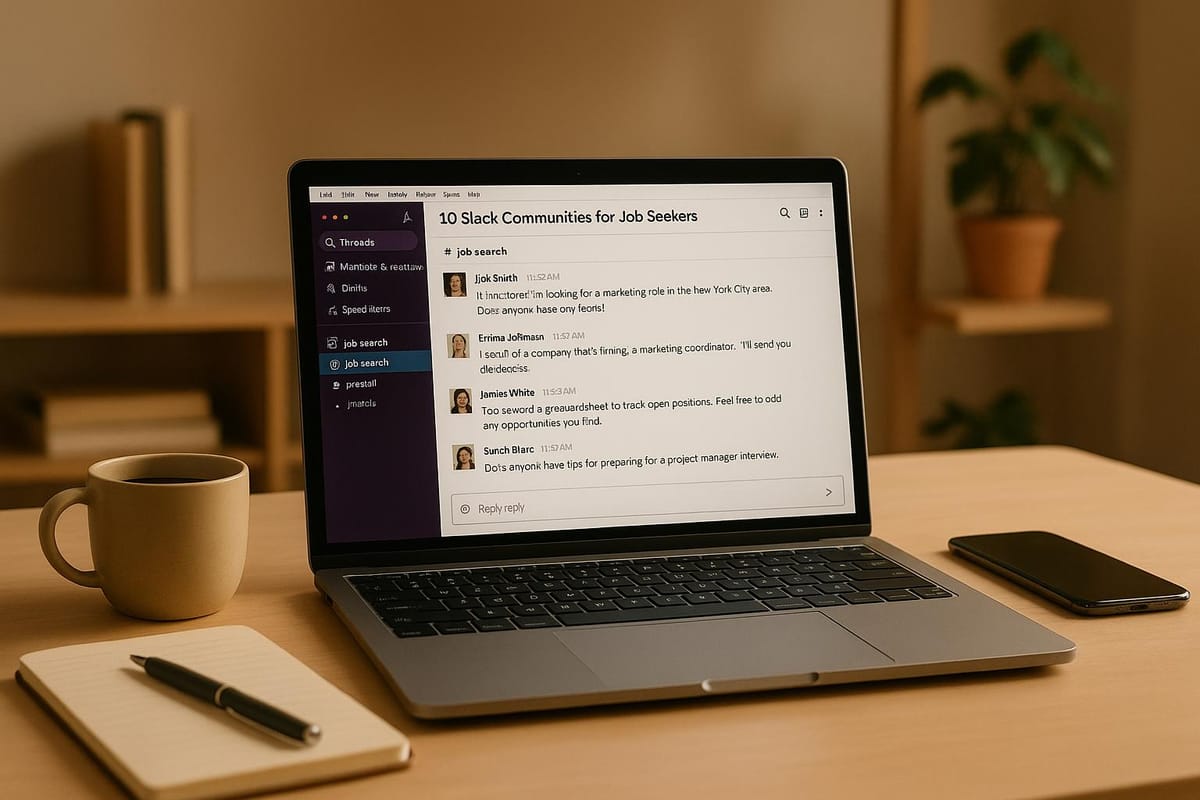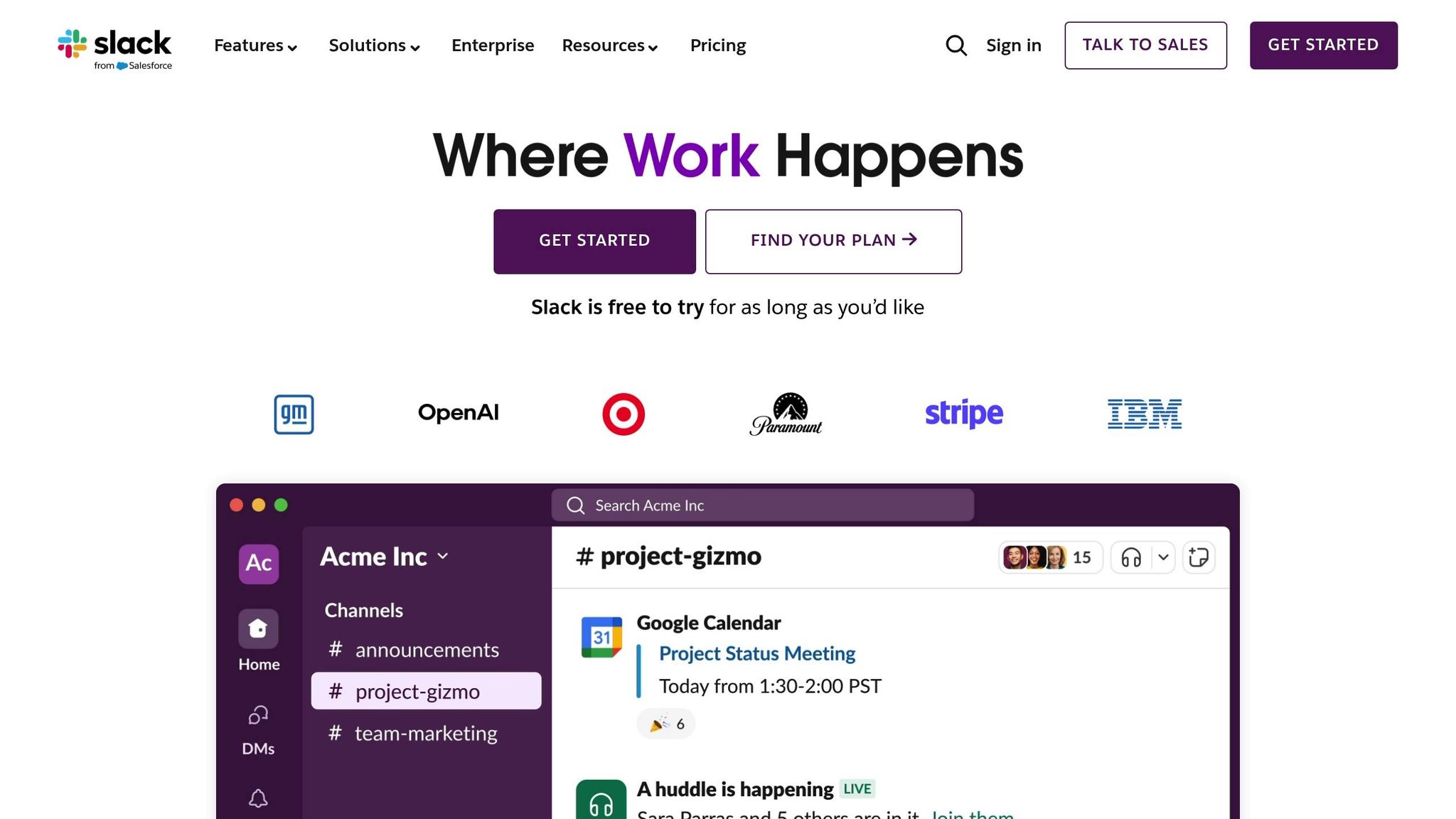10 Slack Communities for Job Seekers
Explore 10 Slack communities designed to connect job seekers with opportunities, networking, and valuable industry insights.

Looking for a job? Slack communities can connect you with professionals, job opportunities, and insider tips across industries. Here's a quick look at 10 Slack groups tailored for job seekers:
- Tech & Design Community: Connect with tech and design professionals for insights and networking.
- Women in Tech Network: A global group with mentorship programs, salary discussions, and visa support.
- Digital Marketing Group: Share trends, advice, and job leads in digital marketing.
- Design & Art Professionals: Showcase your portfolio and get feedback in creative fields.
- Financial Technology Network: Focused on FinTech jobs and industry knowledge.
- Business Strategy Group: Strategy professionals can access job postings, case studies, and mentorship.
- Remote Work Community: Find remote jobs and tips for thriving in remote roles.
- Freelance Professionals: Freelancers can find projects, share portfolios, and get advice.
- Healthcare Network: Specialized channels for healthcare job seekers and interview prep.
- Environmental Careers Group: Sustainability professionals can access green job opportunities.
Quick Tip: Spend time engaging in these communities, refine your Slack profile, and consider tools like scale.jobs to streamline your job search. Networking here can significantly reduce your job search time.
How To Find A Job On Slack - Talent Insights [Ep 35]

1. Tech & Design Community
This community brings together tech and design professionals, offering a space to connect with peers and gain industry insights. Members can focus on preparing for interviews and building meaningful connections, while routine application tasks are handled for them - freeing up more time for networking.
2. Women in Tech Network
The Women in Tech Network connects 70,000 members across 193 countries, offering a mentorship program focused on career development. This 3-month program includes weekly "Office Hours" with leaders from companies like Google and Adobe, providing members with direct access to industry expertise.
Members also benefit from quarterly compensation threads and AMAs with C-suite executives. For example, a 2024 survey revealed an average base salary of $132,000 for mid-level engineers. Additionally, 78% of members reported securing jobs within three months, and the #visa-support channel, moderated by immigration attorneys, facilitated 152 successful H1B transfers in 2023.
The network offers several tools to support members, such as an AI-powered interview simulator, weekly "Coffee Chat" pairings, and fast-track referrals through partnerships with 14 tech companies. The #elevator-pitch channel helps members refine their professional introductions, while the #cultural-nuances channel assists international members in navigating the unwritten rules of American tech workplaces.
To make the most of the network, experts suggest dedicating 20 minutes a day to focused interaction. Integration with automation tools, like scale.jobs' $4-per-hour service, helps members optimize their networking efforts. For those navigating career transitions or workplace challenges, the #safe-space channel - accessible only after verification - offers a supportive environment with a 4.9/5 trust score.
These features highlight how the Women in Tech Network creates opportunities for its members while offering a blueprint for engaging Slack communities in other industries.
3. Digital Marketing Group
The Digital Marketing Group on Slack provides a space for digital marketing professionals to connect, share insights, and find job opportunities. Members can exchange advice on trends and best practices, helping each other navigate their career paths. This community-driven approach works seamlessly with tools designed to simplify the job search process.
One way to enhance your job search is by combining networking with tools that simplify applications. For instance, scale.jobs offers virtual assistants to handle the application process, freeing up your time to focus on interviews and building relationships. As Leela Yanamaddi, Co-Founder of scale.jobs, puts it:
"We're not just another job application service. We're a team that understands your struggles firsthand. We're here to take the burden off your shoulders, so you can focus on what truly matters – preparing for interviews and building meaningful connections." – Leela Yanamaddi, Co-Founder, scale.jobs
According to scale.jobs, 93% of their users secure full-time roles within three months. Pairing Slack networking with automated support like this can speed up your job search and help you land the right opportunity.
4. Design & Art Professionals
The Design & Art Professionals Slack community brings together designers, illustrators, UI/UX experts, and other visual creatives. It's a space where members can share their portfolios, get feedback, and stay updated on industry trends through dedicated channels. Active engagement is essential for building connections and uncovering career opportunities.
To save time on lengthy applications, consider using tools like scale.jobs, so you can dedicate more energy to networking and refining your portfolio. Here’s how to make the most of this vibrant community:
- Share your latest work to showcase your skills.
- Ask for and offer constructive portfolio feedback.
- Join trend discussions to keep up with the latest in design and art.
5. Financial Technology Network
FinTech Slack communities provide a focused space for job seekers to connect with finance professionals and deepen their understanding of the industry. By participating in these groups, you can discover job opportunities and learn from those with firsthand experience.
Don't just scroll through job postings - get involved. Join conversations and attend virtual events to expand your network and sharpen your interview skills.
Here’s how to make the most of your time in these communities:
- Join discussions: Build genuine professional relationships by engaging in meaningful conversations.
- Attend virtual meetups: Learn directly from industry experts during community-hosted events.
- Share and seek advice: Offer your expertise while asking questions to gain practical insights.
To simplify your job search, use tools like scale.jobs, allowing you to dedicate more time to networking and interviews.
6. Business Strategy Group
The Business Strategy Group is a thriving community designed for strategy professionals. With more than 8,000 members and 200 daily messages across channels dedicated to consulting, corporate strategy, and business analysis, this group is a hub for job opportunities and industry insights.
The #job-postings channel is particularly active, featuring 50–70 new positions every week, with 60% of these roles located in the United States. Members can find openings at firms like McKinsey, Bain, and Deloitte, as well as strategy roles at major tech companies.
An impressive 65% of active members land strategy positions within six months - far exceeding the 22% industry average. On top of that, 40% report salary increases of over $15,000 in their new roles.
What Makes This Community Stand Out?
- Weekly case-study workshops led by former MBB consultants
- 200+ interview questions sourced from top consulting firms
- Monthly AMAs with over 50 vetted mentors, including former Fortune 500 Chief Strategy Officers
- Dedicated channels for salary negotiation and project showcasing
The group’s discussions align with current market trends:
| Industry Sector | Share of Discussions |
|---|---|
| Technology | 35% |
| Healthcare | 20% |
| Finance | 18% |
| Consumer Goods | 15% |
The #visa-strategy channel is another popular resource, offering guidance on H1B, OPT, and TN visa processes. Members share updated lists of companies sponsoring visas and participate in quarterly Q&A sessions with immigration attorneys.
To get the most out of the group, join #case-thursdays for live problem-solving sessions. Pair this with the integration of scale.jobs' Strategy Resume ATS Checker to fine-tune your resume. This combination of networking and application tools ensures you’re well-prepared for opportunities. The group’s "give first" culture encourages members to exchange useful resources.
Pro tip: Contribute to the #thought-leadership channel by sharing original market analysis. This often attracts direct messages from recruiters, boosting your visibility and connections within the community.
7. Remote Work Community
Remote work Slack communities are a great way to connect with professionals, discover remote job opportunities, and access helpful resources and industry updates. Unlike general industry groups, these communities focus specifically on the remote work lifestyle.
Popular Community Channels:
- Job boards featuring remote opportunities
- Advice and tools for improving productivity while working remotely
- Region-specific discussions on local remote work policies
These groups often organize workshops on topics like managing time across different time zones, improving virtual collaboration, and effective asynchronous communication. This kind of shared expertise helps members sharpen the skills needed to thrive in remote work environments.
Pairing active participation in these communities with tools like scale.jobs' Remote Job Applications Tracker can make your job search more efficient. This approach allows you to focus on networking and preparing for interviews.
8. Freelance Professionals
Slack communities focused on freelancers bring together independent professionals and project managers. These groups are especially active in channels dedicated to specific skills, such as web development, graphic design, and content writing.
Key Features of These Communities:
- Channels for clients to post project opportunities
- Spaces for freelancers to showcase their portfolios
- Discussions on skill-building and resource sharing
- Advice on negotiating rates and running a freelance business
These communities are great for real-time collaboration and mentorship. Experienced members often share tips on handling clients, setting competitive rates, and keeping a steady flow of projects. This naturally leads to practical networking strategies.
Popular Topics Discussed:
- Contract templates and legal tips
- Tools for time tracking and project management
- Best practices for communicating with clients
- Payment platforms and invoicing solutions
Freelance Slack groups thrive on active participation and smart self-promotion. To make the most of these spaces, consider these networking strategies.
Networking Tips:
- Join discussions regularly and contribute value
- Share your expertise in skill-specific channels
- Respond to project leads within 24 hours
- Keep your portfolio and availability status up to date
For managing project applications, freelancers can use tools like scale.jobs' Job Applications Tracker.
Many of these communities also host virtual meetups and skill-sharing events. These sessions offer freelancers the chance to grow their network, exchange ideas, and stay informed about industry trends while building meaningful professional connections.
9. Healthcare Network
Slack communities centered on healthcare provide specialized channels where members can exchange interview tips and grow their professional networks - key for tackling the challenges of healthcare hiring.
These groups often feature spaces to share interview stories and advice on what employers in the field are looking for. This targeted guidance can help you better prepare for roles in healthcare, offering a structured way to refine your job search approach, much like other industry-specific groups.
10. Environmental Careers Group
The Environmental Careers Group is a Slack community that brings together over 10,000 sustainability professionals, offering connections to job opportunities in the growing green economy. In the #job-alerts channel alone, members can find more than 120 verified job postings each week from companies like Patagonia, Tesla Energy, and the Environmental Defense Fund. According to recent surveys, 68% of active members land jobs within six months - well above the industry average of 41%.
"The #salary-sharing channel revealed that entry-level sustainability analysts in the US earn $58,000-$72,000, with 15-20% bonuses in renewable energy sectors."
The group also features specialized channels, such as #carbon-credits, which provide updates on roles in the carbon market. A visa-tracking channel has recently helped 23 members secure TN visas for renewable energy projects planned for 2024.
Members can take advantage of weekly events like "Green Pitch Fridays", designed to help refine elevator pitches. The community also offers a resource library that includes webinars like "Navigating the Inflation Reduction Act Job Boom." One success story involves a former oil and gas engineer who transitioned to offshore wind farm design at Ørsted, landing a $92,000 position. Partnerships with GreenBiz and the Department of Energy’s Wind Energy Technologies Office keep members informed about the latest industry trends. These targeted networking opportunities enhance the broader benefits of using Slack for job searches.
How to Use Slack Communities Effectively
Once you've identified the right Slack communities, the next step is learning how to make the most of them. Here's how you can boost your networking and job search efforts using Slack.
Polish Your Slack Profile
Start with a professional profile. Use a clear headshot, write a detailed bio, and highlight your career goals. Add links to your LinkedIn profile and portfolio, and set your status to reflect your job search or professional focus.
Choose Channels Wisely
Don't try to be everywhere at once. Pick 3-4 channels that align with your goals and where you can make meaningful contributions.
Engage Thoughtfully
Participate actively by sharing industry knowledge and offering useful advice. This builds your credibility and increases your visibility within the community.
"I would recommend trying out scale.jobs to anyone looking to make more time in their schedule for interview prep and networking, so that the repetitive portion of job application process can be outsourced. I personally feel it's good value for money."
- Anuva Agarwal
Plan Your Time
Set aside 30 minutes each morning to review job alerts and an hour daily for engaging in community discussions. Aim to attend virtual networking events twice a week.
Tap Into Community Resources
Many Slack groups provide resources tailored to job seekers. Teja Aditya Surabhi, a Product Strategy & Growth professional, shared his experience:
"I moved from India to Canada and recruiting worked very differently... applying to jobs was my biggest pain point... I found scale.jobs that helped me focus on the right things. In fact, I was able to build a small micro-service FIREmails.xyz from the time I saved."
- Teja Aditya Surabhi
Streamline Applications
Automate repetitive tasks in the application process. This frees up time for more strategic activities, like engaging in conversations in your selected channels.
Follow Professional Etiquette
- Use threads for in-depth discussions.
- Avoid sending unsolicited direct messages.
- Share your achievements and insights with the group.
- Always respect the community's rules and guidelines.
Combining Community Networking with Job Search
Finding a job often requires a mix of networking and carefully tailored applications. To make the most of your efforts, divide your time between impactful community engagement and focused application tasks.
Smart Time Management
Spending time on the right activities can shorten your job search to just 1–3 months.
Tap Into Community Knowledge
Networking through platforms like Slack can be a game-changer for your job search. Here's how you can use Slack communities effectively:
- Gain insights into company cultures
- Discover job openings that aren't publicly advertised
- Understand what specific teams are looking for
- Stay updated with real-time industry trends and feedback
Use Job Search Tools Effectively
| Activity | Focus Areas |
|---|---|
| Morning Review | Check job alerts and community updates |
| Application Management | Customize resumes and track applications |
| Community Engagement | Join discussions and share insights |
| Interview Preparation | Research, practice, and refine skills |
Combining these tools with active networking can significantly boost your job search results.
"Applying jobs every day has been super daunting. But now with scale.jobs, one can apply to 100s of jobs per day as well as focus on prep for interviews."
- Sona Tambe
Make Networking Count
Harish Reddy Kondapalli, a Product Strategy expert, highlights the benefit of streamlining your job search:
"They took away the work I was missing, which allowed me to relax and not worry about submitting my applications. I was on an extremely busy schedule."
Prioritize High-Impact Activities
To ensure your job search efforts are effective, focus on these actions:
- Take part in meaningful conversations
- Practice with mock interviews
- Share your expertise with others
- Build long-term professional relationships
Conclusion
Slack communities can be a powerful tool in your job search. Research shows that 46% of job placements come through personal networking, and active participation in Slack groups can reduce your job search time from five months to just 1–3 months.
To make the most of these communities, balance your time between engaging in Slack discussions and preparing for interviews. As Shubham Dhakle, Outcome Manager, puts it:
"You should focus on what matters the most - Interview Prep and let us handle the rest".
With only 2% of applicants receiving interview callbacks, combining networking through Slack with solid interview preparation can make a big difference.
Here’s what Slack communities can offer:
- Insights into company cultures
- Access to hidden job opportunities
- Meaningful professional connections
- Up-to-date industry trends
Nearly half of job seekers - 47% - have landed full-time roles through networking and personal initiatives. Using Slack communities alongside targeted strategies doesn’t just help you find a job; it helps you build a network that can support your career long-term.
Check out scale.jobs for free tools to enhance your networking and job search efforts. These resources align perfectly with the strategies discussed here.
FAQs
How can Slack communities help me improve my job search?
Joining Slack communities can significantly enhance your job search by connecting you with like-minded professionals, recruiters, and industry experts in real-time. These communities often share job opportunities, insider tips, and resources tailored to specific fields like tech, design, and marketing, helping you stay informed and ahead of the competition.
Additionally, Slack groups foster networking opportunities, allowing you to build relationships with peers and mentors who can provide valuable advice or referrals. By participating in discussions and showcasing your expertise, you can make meaningful connections that may lead to job offers or career growth opportunities.
How can I effectively engage with Slack communities to expand my professional network?
Engaging with Slack communities can be a powerful way to grow your professional network and discover new opportunities. Here are some tips to make the most of these communities:
- Be active and participate regularly: Introduce yourself in the appropriate channels, contribute to discussions, and share valuable insights or resources.
- Follow community guidelines: Respect the rules and culture of the group to build a positive reputation.
- Ask thoughtful questions: Seek advice or feedback on specific topics to spark meaningful conversations.
- Offer help when possible: Sharing your expertise or assisting others fosters goodwill and strengthens connections.
By staying engaged and authentic, you can build relationships and uncover opportunities that align with your career goals.
How can Slack communities and tools like scale.jobs work together to support job seekers?
Slack communities provide a platform for job seekers to network, share advice, and discover opportunities in their industries. Tools like scale.jobs complement this by handling time-consuming tasks such as applying to jobs, creating tailored resumes, and writing custom cover letters.
By combining the networking benefits of Slack communities with the efficiency of scale.jobs, job seekers can focus more on building connections and preparing for interviews, while spending less time on repetitive application processes.




